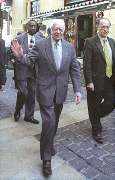Hizbullah declines to meet with visiting former U.S. president

|
|
Former U.S. President Jimmy Carter shakes hands with Lebanon Christian opposition leader Michel Aoun (R) and deputy Elie Skaff (C) during a meeting in Beirut December 11, 2008. REUTERS/ Mohamed Azakir |
The presidential visit and trip to the south came as Hizbullah reportedly declined an invitation to meet with the former head of state.
Carter had said he was ready to meet with the group, which the U.S. considers a “terrorist” organization. if it agreed to see him.
Carter made the comments upon arrival in Lebanon where he was to assess whether his Atlanta-based Carter Centre would take part in monitoring next year’s parliamentary elections.
“I am going to meet with all of the political parties as possible,” Carter said. “I understand that several leaders of Hizbullah said they were not going to meet with any president or former president of the United States, so I don’t know yet.”
Leader of Hizbullah’s parliamentary bloc Mohammad Raad told AFP that the group “does not meet with anyone from a U.S. administration which supports Zionist terrorism.”
Regarding the Carter Center’s potential monitoring role in the springtime polls, Raad said the party “will accept whatever decision the Cabinet makes.”

|
|
Former U.S. President Jimmy Carter waves as he walks near parliament building in down town Beirut December 11, 2008. REUTERS/ Mohamed Azakir |
Carter was widely criticized in April when he met in Syria with Khaled Meshaal, the exiled Hamas political leader.
The U.S. also labels Hamas, the Palestinian group that controls the Gaza Strip, a “terrorist” organization.
After meeting with Sleiman, Carter took an aerial tour of the Blue Line in South Lebanon and spoke with United Nations Interim Force in Lebanon (UNIFIL) officials. “I strongly urge all parties to seize this opportunity to work toward peace,” Carter told the troops.
UNIFIL commander, Claudio Graziano, said that Carter’s visit “testifies to the international community’s support for our mission and underlines the importance of the continued commitment of the parties to their respective obligations under UN Security Council Resolution 1701.”
In an opinion piece published Wednesday in The Washington Post, commemorating the 60th anniversary of the Universal Declaration of Human Rights, Carter voiced the hope that President-elect Barack Obama’s new administration could usher in a new era of effective American diplomatic leadership in the region and across the world.
“Throughout the Middle East, there is hope that the United States will move more aggressively and persistently to help orchestrate a solution to the Israeli-Palestinian conflict, the prism through which the region measures the US commitment to human rights,” Carter wrote.
According to a Carter Center press release, after his visit to Lebanon, he will travel to Syria to meet with President Bashar Assad. The two are expected to discuss the prospects for Middle East peace.
News reports have suggested that Carter may also meet with Hamas representatives in Damascus.
Carter, the 39th American president and a chief architect of the first Camp David Accord, will be speaking Friday to an audience of students, faculty and invited guests at American University of Beirut.
-Aljazeera and The Daily Star
Former U.S. President Jimmy Carter shakes hands with Lebanon Christian opposition leader Michel Aoun (R) and deputy Elie Skaff (C) during a meeting in Beirut December 11, 2008. REUTERS/ Mohamed Azakir
Former U.S. President Jimmy Carter waves as he walks near parliament building in down town Beirut December 11, 2008. REUTERS/ Mohamed Azakir






Leave a Reply